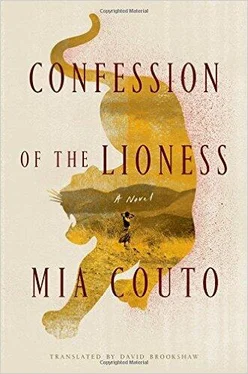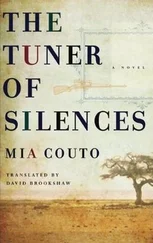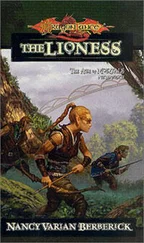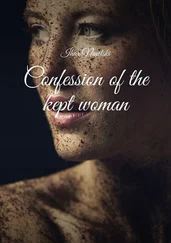Come and see her grave. It’s right here, not far.
We cross some waste ground until we get to some nearby thickets. The grave is marked with a wooden cross and a large granite stone. Some wildflowers have been placed on this improvised gravestone. Some of them are still fresh.
Pretty flowers. Do you people bring them?
Us? You’re the one who brings flowers.
Me?
Early each morning, you get down on your knees here and speak to the dead girl.
* * *
Hanifa leads me back to the house, while I am tormented by doubt: How was she able to invent a story about me bringing flowers for Silência? The woman’s mad, I think.
In the yard, I hear someone cough behind a screen made of reeds. When I go to take a look, Hanifa pulls me by the arm and makes me sit down on the only chair.
It isn’t anyone, only dogs. Those that haven’t yet been eaten by the lions.
My hostess takes a pan of boiled sweet potato from the kitchen and serves it on an earthenware plate. I’m not hungry, but I can’t refuse. We share the food in silence.
I talk about killing Genito, but it’s the whole of Kulumani that I’d like to get rid of.
Why are you so angry, Hanifa?
Here we are, the two of us, eating together. In Kulumani, that’s forbidden. A man and a woman eating together? Only if the man is bewitched.
Who knows, maybe I am bewitched.
Suddenly I hear the noise of crockery falling from the thatch of a lean-to where it has been left to dry. And I see the shape of a woman rush by to hide behind the house.
Who is that?
It’s no one.
But I saw her, I saw a woman hiding.
That’s what I told you: Here, a woman is no one …
She gets up and without more ado leads me around to the front yard. It’s a way of telling me that my visit is coming to an end. She wants to give me a few roots of manioc. I decline the gift gently. Before I leave, she takes my hands and asks:
You have such a deep sadness within you. What’s the matter?
Nothing. Nothing’s the matter. Why do you ask?
Why do you waste your time talking to a solitary old black woman like me?
Mariamar’s Version: SIX. A River Without Sea
Wise is the firefly, for he uses the darkness to light up.
— A PROVERB FROM KULUMANI
On the night Archie arrived, I dreamed I was a hen languishing in Genito Mpepe’s chicken coop. The other hens were my sisters. We lived a daily life shorn of history, like all those birds that are devoid of flight. In the meantime, we began to hear about chickens elsewhere who had turned into vultures. And we prayed that we would undergo the same metamorphosis. As vultures, we would ascend into the freedom of the skies and soar aloft in dizzying flight. But the miracle was long in coming.
One day, as he was feeding us corn, Grandfather Adjiru explained: It wasn’t the mesh of the chicken coop that was separating us from freedom. The secret of our submission lay somewhere else, and dwelled deep within us: Every morning, Genito Mpepe would hypnotize us. A finger swaying like a pendulum in front of our beak was enough to plunge us into immobility, dead to the world. And when one of us seemed to awaken to life, our owner would place our head under our wing, and we would immediately sink back into our endless lethargy.
* * *
The dream recurred on the following nights. It was as if dreams were trying to warn me of something. That something, I now know, was fear. And everything has become clear: It wasn’t on some whim that Archie abandoned me. His disappearance can be explained by fear. What he suffered from was the age-old terror that underneath the lake’s surface lurked monsters. The suspicion that, concealed under my placid appearance, there dwelled a beast that would devour him. That was Archie’s fear.
The truth is that Archie hadn’t been made to share his existence. The greatness of a hunter lies in his solitude. His attacks of panic, his cowardice, bear no witnesses. Only his victim knows of his weaknesses. That’s why the hunter is in a desperate hurry to be free of his prey.
* * *
Sixteen years ago, when Archie Bullseye watched me dancing at the village festival, he was already troubled by uncertainty. The hunter was afraid of what my body seemed to be saying, he was scared of whoever was speaking through my body while the drums beat. For him, ignorant of this language, it could only be dark forces. Demons speak like that, without words, saying everything through the body’s carnality. This was his fear. But it wasn’t demons who were making my body quiver. It was gods that speak and listen within us women. Archie’s fear was the same as that of all men. That the time might return when we women were divinities. On getting entangled with me, with the gentleness of a light breeze, Archie wanted the protection and the blessing of these entities. But our gods are not the same. His slept inside books. Mine awoke with music. That’s what the hunter didn’t understand. I wasn’t dancing. I was doing something else: I was freeing myself from time and responsibility, just as a snake sheds its old skin.
* * *
What was happening to me now in this imposed confinement had already happened to me before. Sixteen years ago, when Archie Bullseye left the village, I lay on the veranda and watched the days go by. I was undergoing the same constriction that butterflies experience at a certain time. I was migrating into a chrysalis, wrapped in time and waiting for another creature to emerge from within me. Seeing me defeated and cowed, under the porch of our house, everyone assumed I’d returned to my paralysis of old. But my feeling of emptiness was only an appearance. For I knew that, though ephemeral, Archangel Bullseye’s love had borne fruit. I waited until my belly had become rotund, and on the very day of my seventeenth birthday, I appeared before my mother with an air of triumphant defiance.
So you thought I wasn’t a woman? Put your hand here, feel what I’m carrying inside me.
Her arm felt feeble in my hand and drooped even before touching my belly.
Have you heard a thunderclap and thought it’s already raining, Mariamar? Well, there’s still many a knot in the thread of time.
I don’t understand, Mother.
I was lying. I knew what she was insinuating. The women of Kulumani, in each month of pregnancy, tie a knot in a piece of string that is passed from generation to generation.
We are women , she said. We were made to overcome suffering.
Not another word after that. Only an enigmatic smile that bordered on scorn. Without saying anything, my mother was scratching at an old wound: I was barren, my aridity had no cure.
Don’t look at me like that, my daughter. You know very well whose fault it is.
There was no doubt: I was prevented from becoming a mother because of the beating I’d had from my father. Even the nurse had confirmed the grave consequences of all those kicks.
There are children who are born and die within us , Hanifa affirmed, putting an end to the conversation.
These were words written by the hand of fate. For on that very night, I was woken from sleep by a nightmare: Deep inside me, a carnivorous beast was devouring my baby. My mulatto baby, my impure child, conceived on the road, was vanishing like a dream in the darkness. I awoke with a start, my sheet was wet: Blood was visiting me, turning my thighs red. I screamed, insulting my mother, shouting that I was giving birth. That blood on the bed was a creature, a living clot of plasma, a blood-person.
Читать дальше












